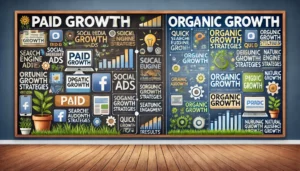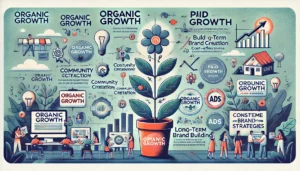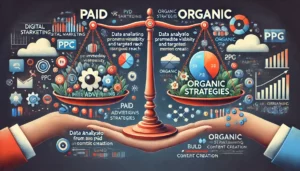Debating Paid vs Organic Growth: Insights and Opinions

In the world of marketing, businesses often debate between paid vs organic growth strategies. Both have their own perks and challenges. Paid growth can bring quick results, while organic growth focuses on building lasting relationships. This article dives deep into the pros and cons of each approach, offering insights to help you choose the best path for your business.
Key Takeaways
- Paid growth delivers fast results but can be costly.
- Organic growth builds trust and credibility over time.
- Balancing both strategies can maximise your marketing efforts.
- Paid campaigns offer precise targeting, while organic methods may have unpredictable outcomes.
- Your choice should align with your business goals and budget.
Understanding Paid vs Organic Growth
When we talk about growth strategies, we often hear about paid and organic growth. Both have their unique advantages and challenges. Let’s dive into what each one means and how they differ.
Defining Paid Growth
Paid growth involves using money to drive traffic and conversions. This can include advertising campaigns on social media, search engines, or other platforms. The main goal is to get quick results by reaching a targeted audience.
Defining Organic Growth
Organic growth, on the other hand, is all about growing naturally without spending money on ads. This involves creating valuable content, engaging with your audience, and building a community. It’s a slower process but can lead to more sustainable results.
Key Differences Between Paid and Organic Growth
The key difference between paid and organic growth lies in the approach and speed. Paid growth offers immediate results but requires a budget. Organic growth takes time but builds trust and credibility. Both strategies are essential for a balanced growth plan.
Debating Paid vs Organic Growth: Benefits of Paid Growth
Immediate Results
When we invest in paid growth, we see results almost instantly. This is one of the biggest advantages. Unlike organic methods, which can take months to show progress, paid strategies can boost our visibility and engagement within days. Immediate results mean we can quickly assess the effectiveness of our campaigns and make necessary adjustments.
Targeted Advertising (Debating Paid vs Organic Growth)
Paid growth allows us to target specific audiences with precision. We can choose who sees our ads based on demographics, interests, and behaviours. This level of targeting ensures that our message reaches the right people at the right time. For instance, PPC Geeks offers services in ecommerce, Amazon ads, SEM marketing, and more. Specialising in PPC, they help businesses improve online visibility and marketing strategies.
Scalability
One of the most significant benefits of paid growth is its scalability. As our business grows, we can easily scale our advertising efforts to match our needs. Whether we want to increase our budget or expand our reach, paid growth provides the flexibility to do so. This means we can support our business objectives and drive continuous growth without being limited by our current resources.
Paid growth strategies offer a quick and effective way to enhance our marketing efforts, ensuring we reach our target audience and achieve our business goals.
Debating Paid vs Organic Growth: Advantages of Organic Growth
Organic growth is a powerful way to build a brand without relying on paid advertising. By consistently engaging with our target audiences, we can enjoy numerous benefits. One of the most significant advantages is cost-effectiveness. Since we don’t need to spend money on ads, we can allocate our budget to other important areas.
Cost-Effectiveness
Organic growth is a powerful way to build a brand without relying on paid advertising. By consistently engaging with our target audiences, we can enjoy numerous benefits. One of the most significant advantages is cost-effectiveness. Since we don’t need to spend money on ads, we can allocate our budget to other important areas.
Building Trust and Credibility (Debating Paid vs Organic Growth)
When we grow organically, we build trust and credibility with our audience. People tend to trust brands that don’t rely solely on paid promotions. This trust can lead to increased brand loyalty and customer retention. Building a community around our brand can also enhance our reputation and make us more relatable to our audience.
Sustainable Long-Term Results
Organic growth often leads to sustainable long-term results. Unlike paid campaigns that may stop delivering results once the budget runs out, organic strategies can continue to bring in new customers over time. This makes organic growth a more sustainable option for long-term success. We can focus on creating valuable content and engaging with our audience to maintain steady growth.
Organic growth is not just about saving money; it’s about building a lasting relationship with our audience. By focusing on genuine engagement and valuable content, we can achieve sustainable success.
Debating Paid vs Organic Growth: Challenges of Paid Growth
Paid growth strategies come with their own set of challenges that we must navigate carefully. One of the most significant hurdles is the high costs associated with running paid campaigns. These expenses can quickly add up, especially for small businesses with limited budgets. Another issue is ad fatigue, where audiences become tired of seeing the same ads repeatedly, leading to decreased effectiveness over time. This can make it difficult to maintain engagement and achieve desired results. Additionally, there’s a heavy dependence on budget, meaning that once the funding stops, so does the growth. This reliance can be risky, particularly if financial resources are strained.
Debating Paid vs Organic Growth: Drawbacks of Organic Growth
Time-Consuming
Organic growth often requires a significant investment of time. We need to create quality content, engage with our audience, and build relationships. This process can take months or even years to show substantial results. Immediate results are not a hallmark of organic strategies.
Unpredictable Results (Debating Paid vs Organic Growth)
The outcomes of organic growth can be quite unpredictable. Algorithms change, audience preferences shift, and what worked yesterday might not work today. This makes it challenging to maintain consistent growth. We must stay adaptable and continuously refine our strategies.
Limited Reach
Without the boost from paid promotions, our reach can be limited. Organic methods rely heavily on our existing audience and their networks. This can make it difficult to break into new markets or significantly expand our customer base. We often find ourselves needing an expert guide on social ads to complement our organic efforts.
Balancing organic and paid strategies can help mitigate these drawbacks and create a more robust growth plan.
Integrating Paid and Organic Strategies
Integrating paid and organic strategies is crucial for a well-rounded marketing approach. By combining both, we can leverage the strengths of each to maximise our results. Paid strategies, like those offered by a PPC agency, provide immediate visibility and targeted reach. On the other hand, organic strategies build trust and long-term engagement.
Creating a Balanced Approach
A balanced approach involves using data from paid campaigns to inform our organic content. For instance, if a particular ad performs well, we can create similar organic posts. This synergy ensures that our efforts are cohesive and effective.
Leveraging Data from Paid Campaigns (Debating Paid vs Organic Growth)
Paid campaigns offer valuable insights. By analysing this data, we can refine our organic strategies. For example, understanding which keywords perform best in a Google ads audit can help us optimise our organic content for better search engine rankings.
Maximising ROI
To maximise ROI, it’s essential to integrate both strategies seamlessly. This means continuously monitoring and adjusting our tactics. By doing so, we ensure that our marketing efforts are both cost-effective and impactful.
Case Studies: Success Stories in Paid Growth
E-commerce Brands
E-commerce brands have seen remarkable success with paid growth strategies. For instance, an Amazon Sponsored Products campaign can significantly boost visibility and sales. By targeting specific keywords and demographics, these brands can reach a wider audience quickly. This approach not only drives immediate traffic but also helps in achieving long-term business KPIs.
Service-Based Businesses
Service-based businesses, such as travel agencies and hotels, benefit greatly from paid social media ads. Facebook ads, with their sophisticated targeting, can effectively promote experience-based services like skydiving or luxury stays. These ads often result in higher engagement and conversions, making them a valuable tool for service providers.
Startups
Startups often rely on paid growth to make a significant impact in a short time. By investing in PPC campaigns, they can quickly generate leads and build brand awareness. This method is particularly useful for new businesses looking to establish a strong market presence without waiting for organic growth to take effect.
Paid growth strategies offer a quick and effective way to reach your target audience and achieve your business goals. Whether you’re an e-commerce brand, a service-based business, or a startup, investing in paid campaigns can yield impressive results.
Case Studies: Success Stories in Organic Growth
Content Marketing
We’ve seen numerous businesses thrive through content marketing. By consistently producing valuable and relevant content, companies can attract and retain a clearly defined audience. For instance, a blog that offers solutions to common problems can drive significant traffic over time. This approach not only boosts SEO but also establishes the brand as an authority in its field.
Social Media Engagement
Engaging with audiences on social media platforms can lead to impressive organic growth. By growing your account organically and consistently engaging with your target audiences, you can reap lots of rewards, such as increasing your brand loyalty, improving customer care, boosting your SEO, and much more. One notable example is an Aussie ecommerce company called “Appliances Online,” which achieved good organic social results with 5x the reach and 2x the engagement rate on a 385k follower base. This demonstrates the power of genuine interaction and community building.
SEO
Search Engine Optimisation (SEO) remains a cornerstone of organic growth. By optimising website content for search engines, businesses can improve their visibility and attract more visitors. A well-optimised site not only ranks higher in search results but also provides a better user experience. This dual benefit can lead to sustainable long-term growth. It’s a strategy that requires patience but pays off in the long run.
Organic growth strategies, while time-consuming, offer sustainable and credible results that can significantly benefit businesses in the long term.
Expert Opinions on Paid vs Organic Growth
Industry Leaders’ Insights
Industry leaders often highlight the importance of a balanced approach. They argue that while paid growth offers quick wins, organic growth builds a solid foundation. For instance, many e-commerce brands have seen exceptional results by combining both strategies. Paid campaigns can drive immediate traffic, but organic efforts ensure long-term customer loyalty.
Marketing Experts’ Views (Debating Paid vs Organic Growth)
Marketing experts agree that both paid and organic growth have their place. They suggest using data from paid campaigns to inform organic strategies. This way, you can understand what resonates with your audience. For example, if a particular ad performs well, it can guide your organic content. This synergy can maximise your overall marketing effectiveness.
Future Trends
Looking ahead, the integration of machine learning and AI is expected to revolutionise both paid and organic growth. These technologies can optimise campaigns in real-time, making them more efficient. We believe that the future will see a more seamless blend of both strategies, driven by data and automation.
Combining paid and organic growth strategies is not just a trend; it’s a necessity for sustainable success.
In summary, the debate between paid and organic growth is ongoing, but the consensus is clear: a hybrid approach is the way forward.
Debating Paid vs Organic Growth: Choosing the Right Strategy for Your Business
When it comes to selecting the best growth strategy for your business, it’s crucial to consider several factors. Each decision involves trade-offs that must align with your overall business strategy, capabilities, and market dynamics. Let’s explore how to make the right choice.
Assessing Your Goals
First, we need to clearly define our business goals. Are we aiming for greater brand awareness, more leads, or increased sales? Understanding our objectives will guide us in choosing between paid and organic growth strategies. Knowing our goals helps us focus our efforts effectively.
Budget Considerations (Debating Paid vs Organic Growth)
Next, we must evaluate our budget. Paid growth strategies, like PPC marketing, can deliver quick results but often come with high costs. On the other hand, organic growth strategies are more cost-effective but require time and consistent effort. Balancing our budget with our growth goals is essential.
Market Position
Finally, we should consider our market position. If we’re a new player, paid growth might help us quickly gain visibility. However, if we already have a strong presence, focusing on organic growth can help us build trust and credibility. By understanding our market position, we can choose the strategy that best supports our long-term success.
To grow profitably over the long term, companies need a strategy that addresses how fast to grow, where to seek new demand, and how to amass the resources needed to grow.
Debating Paid vs Organic Growth: Tools and Resources for Managing Growth
Managing growth effectively requires the right tools and resources. Let’s explore some of the essential ones that can help us navigate this journey.
Managing growth can be challenging, but with the right tools and resources, it becomes much easier. Our website offers a variety of solutions to help you navigate this journey. From expert advice to practical tools, we’ve got you covered. Visit our site today to explore how we can assist you in achieving your growth goals.
Conclusion
In the end, both paid and organic growth have their own strengths and weaknesses. Paid growth can give you quick results and a wider reach, but it can be costly. On the other hand, organic growth builds trust and loyalty over time, but it requires patience and consistent effort. The best approach often involves a mix of both strategies, tailored to your specific needs and goals. By understanding the benefits and limitations of each, you can make smarter decisions for your business. Remember, the key is to stay flexible and adapt your strategy as you learn what works best for you.
Frequently Asked Questions
What is paid growth?
Paid growth means using money to promote your business. This can be through ads on social media, search engines, or other websites.
What is organic growth?
Organic growth is when your business grows naturally without paying for ads. This can happen through word of mouth, social media posts, or search engine results.
How is paid growth different from organic growth?
Paid growth involves spending money to get quick results, while organic growth takes time and doesn’t cost money.
What are the benefits of paid growth?
Paid growth gives fast results, allows you to target specific audiences, and can be easily scaled up.
Why is organic growth important?
Organic growth is important because it’s cost-effective, builds trust, and provides long-lasting results.
What are the challenges of paid growth?
Paid growth can be expensive, people can get tired of seeing the same ads, and it relies on having a budget.
What are the drawbacks of organic growth?
Organic growth can take a long time, the results are unpredictable, and it might not reach as many people.
Can paid and organic growth be used together?
Yes, using both strategies together can create a balanced approach, helping you get quick results while building trust over time.
Author
Search Blog
Free PPC Audit
Subscribe to our Newsletter
The Voices of Our Success: Your Words, Our Pride
Don't just take our word for it. With over 100+ five-star reviews, we let our work-and our satisfied clients-speak for us.
"We have been working with PPC Geeks for around 6 months and have found Mark and the team to be very impressive. Having worked with a few companies in this and similar sectors, I rate PPC Geeks as the strongest I have come across. They have taken time to understand our business, our market and competitors and supported us to devise a strategy to generate business. I value the expertise Mark and his team provide and trust them to make the best recommendations for the long-term."
~ Just Go, Alasdair Anderson




